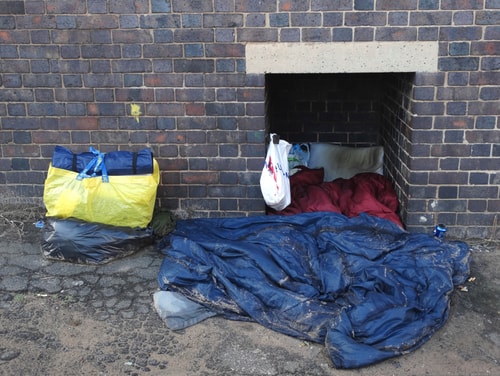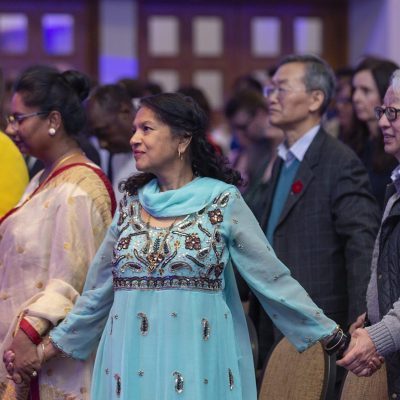I first met Pete Cunningham at the Evangelical Alliance’s London resource centre in February last year, when I interviewed him for idea magazine.
The founder and director of Green Pastures CBS Limited spoke with conviction about the plights of homeless people around the country and what his Christian organisation can do, with the support of the church, to make available much-needed adequate housing for those living in insecure accommodation or on the street.
Some 12 months later, after a very brief visit in December, Pastor Pete, as he is known, was back. Donning his signature flat cap and clutching his well-used leather briefcase, Pete had something important to tell me, and the wider evangelical church. “God,” he said, “wants the church to end homelessness.”
I must admit, I wondered if Pete had heard right, or whether this was just the naïve optimism of a 76-year-old Christian who remains moved by the compassion of Jesus Christ. Nonetheless, I agreed to interview him. For, who am I to question what goes on between a Father and His child?
At the end of 2018 you popped into the Evangelical Alliance’s resource centre in London and shared with me that God had laid it on your heart to bring Christians together to end homelessness in Merseyside. What exactly did God say?
God doesn’t want anyone sleeping on the streets of the UK; He wants to see an end to homelessness. What God made clear to me, though, is that He wants the church to eradicate homelessness, starting with Merseyside. As well as providing a stable and secure home for some of our country’s most vulnerable individuals and families, God wants to prove that the church can change a social welfare issue that the government, both local and national, hasn’t been able to. This will demonstrate the glory of God, who works through His people, and let the citizens of this country know that the church is still relevant.
What is the situation with homelessness in Merseyside?
Across the five metropolitan boroughs of Merseyside (Knowsley, St Helens, Wirral, Sefton and Liverpool), there are 200 families living in temporary accommodation. (These are the numbers provided by the five borough councils.) This means that as many as five people, including parents and children, could be living in a one-bedroom flat or, worse still, a bedsit. Add to this the number of homeless people who are sleeping rough. According to Liverpool City Council (LCC), 78 people are sleeping on the street in the city. The other four councils have varying numbers of the people who are sleeping rough.
But we think these figures are low and do not accurately reflect the reality. Take LLC’s statistic on rough sleepers as an example; we believe the figure is significantly higher than that and around 150 people are actually sleeping on the street. On top of that, there are most probably 300 – 400 single people living in hostels – temporary accommodation – in Merseyside. All these figures increase each year, so in 2020 there’ll be another 200 families or 300 single people who have nowhere to live. So, the cost to take care of these individuals and families will continue to spiral.
A lack of housing, especially that which is affordable, has long been pinpointed by politicians and many others as the cause of homelessness. Do you agree?
It’s true: we’re in this mess because there are not enough houses being built. As a country on a whole, we are 150,000 homes short every year. This shortfall is a huge issue when the number of people living in temporary accommodation is growing. Overcrowding is a big problem too: people who live in overcrowded properties will get onto the social housing list but due to the shortage, the local authority has no option but to put them as a low priority.
At this moment in time, the government doesn’t have the funds to spend on housing. We need billions of pounds worth of investment every year and the government doesn’t have the money. Private developers build homes for commercial reasons, so we’re currently seeing as little as 10,000 units built per annum for the social benefit of people. Who suffers the most? The poor, who face tremendous difficulty getting housed.
Most of the homeless stats you’ve referenced pertain to ‘homeless but housed’ individuals and families. Should they be a high priority when so many people are sleeping on the street?
We should be incredibly concerned about the people who are living in temporary accommodation, because families are often broken up and children can end up in care. These typically become the marginalised in our communities; and unless families are reconciled, where they can look after themselves, the children are likely to become the young people and young adults of the future who have gone off the rails. So, it’s urgent that we get these people in suitable, stable housing as soon as possible.
With the government authorities in Merseyside opening new refuges and pumping money into homeless prevention, and then agencies offering services, partnership is surely the most effective approach.
Of course – the opportunity of partnership with others is what we’re all about. We’ve already got 10 – 12 partners on board, including ARCH (the Austin Resource Center for the Homeless), Crisis and Victory Outreach in Liverpool. We have so far bought enough to help seven people.
Plus, three Merseyside councils said they would like to work with us: we have offered Wirral one house; we’re waiting for St Helens council to give us ‘the okay’; and Mosely has said that it’s trying to get the application through. Meanwhile, the mayor of Liverpool has showed signs of interest, but we’re yet to hear from Sefton.
It seems councils and the appropriate agencies are coming together to tackle this crisis. Is it essential that the church also gets involved?
To put it bluntly: Jesus commissioned the church, not the government. Yes, I might be radical in thinking that, but it’s true. Christians may think and say that they pay their taxes so the government should sort it, but such an attitude isn’t biblical. The Bible has numerous accounts of the church of God stepping in, and I believe we should do the same today.
Plus, what makes us so sure the government can fix the problem? Green Pastures monitors exactly what happens with local and national governments, and their strategies have and do fail, just like the project they put in place to help people leaving prison. We warned the government about the prison project; it’s a shame our advice was ignored.
Okay, so the government can’t, and shouldn’t be expected to, do it alone. But surely there should be some onus on homeless individuals too?
Homeless people shouldn’t be stripped of responsibility; what’s the use in doing that? But we should all bear in mind the serious challenges they face. With single people, for example, many struggle to hold down a job, owing to mental health problems, learning difficulties or a lower education level. Some, through social enterprise partnerships, get into work, but can only manage 16 hours a week. Others can’t even get a job because they have a criminal record.
Many families, meanwhile, can’t manage their money and, as a result, get evicted for non-payment of rent. We try to offer them a package, to help them get back on their feet: health and social care as well as a money management course. We also try to put them on a job training course. We attempt to offer what is lacking in their lives because the infrastructure isn’t always there to support them. We’re always hopeful a good chunk will improve, get established and return to work.
Each town or city around the UK has its own set of needs that the church is responding to, so are you seeking support from specific churches and organisations in Merseyside?
There are so many ways the church can benefit its local community and change our country, all underpinned by the love God has for people. We need churches that would like to help us look after the people, Christians in Merseyside who are interested in ending homelessness.
Consider this: there are around 1,000 churches in Merseyside; if one person from each church gave £100, that’d be more than enough to help homeless people over the next three years. We can do a great deal if we each put in a little; you see, a little from many adds up to a huge amount.
To find out more about the work Pastor Pete is doing to eradicate homeless and make contact with him, visit the Green Pastures website. To read his interview that featured in the May-June 2018 edition of idea magazine, click here.
Photo by Neil Theasby



